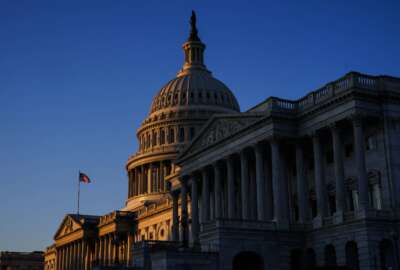
House GOP prioritizes end to ‘unnecessary’ federal programs, cutting $80B from IRS
The Republican-led House is looking at opportunities to eliminate duplicative federal agencies and programs, as well as defund the IRS.
The Republican-led House is looking at opportunities to eliminate duplicative federal agencies and programs, as well as rescind $80 billion that would help the IRS rebuild its workforce and its legacy IT systems.
House Republican leaders are doubling down on a promise made before last year’s midterm elections to make defunding the IRS a top legislative priority at the start of the 118th Congress.
House Republicans, however, cannot proceed on these priorities until the full chamber decides on a new Speaker of the House. Republican leader Kevin McCarthy (R-Calif.), a top contender for the position, failed in several rounds of voting Tuesday to secure the top job.
House Majority Leader-elect Steve Scalise (R-La.), in a Dec. 30 letter to colleagues, said he expects party leaders will introduce a bill in the first two weeks of the new session that would eliminate the $80 billion granted to the IRS over the next decade through the Inflation Reduction Act.
The bill, however, is unlikely to move forward with a majority of Democrats remaining in the Senate.
Scalise said the bill would address “Biden’s army of IRS agents,” and would hamper the IRS’ ability to hire 87,000 new employees over the coming years. The IRS, however, plans to make most of these hires just to keep up with its expected rate of attrition.
The IRS expects about 52,000 employees will retire or leave the agency over the next five years. The agency has a workforce of about 83,000 employees.
Scalise said the list of legislative priorities for House Republicans reflects meetings held with the incoming committee chairpersons on how to “hit the ground running” in the first weeks of the new session of Congress.
Tony Reardon, national president of the National Treasury Employees Union, said the upcoming bill to defund the IRS is “a stunt that will not pass.”
While more than $45 billion of the Inflation Reduction Act spending will go toward tax enforcement activities, Reardon said the Treasury Department has directed the IRS to focus its hiring efforts first on “reinforcing the depleted corps of customer service representatives who answer the phones or meet with taxpayers every day.”
“The long-term funding for the IRS as provided by the Inflation Reduction Act of 2022 is — as we speak — rebuilding, modernizing and upgrading agency services for all taxpayers. Derailing these major new reforms, a top priority for the new Republican majority in the House, is short-sighted and destructive,” Reardon said.
House Republicans, in a rules package released this week, also plan to a requirement for most committees to draft an “authorization and oversight plan” in the coming months.
Those plans, according to the proposed rules package, will give committees an opportunity to recommend whether to “consolidate or terminate duplicative or unnecessary programs and agencies.”
The plans will include a list of agencies and programs that continue to receive annual appropriations but haven’t been reauthorized by Congress.
The document should outline each committee’s plans for agencies and programs it intends to reauthorize, as well as plans for oversight.
Committees must also draw up a similar list of permanently authorized agencies and programs that have not received comprehensive review within the past three sessions of Congress.
Committee leadership should also outline any recommendations to move any agency or program funding from mandatory to discretionary funding.
Most committees must submit their plans to the House Oversight and Accountability and House Administration committees no later than March 1.
The House Appropriations, Ethics and Rules committees are exempt from the requirement to draft these plans.
House Republicans also plan to create a Select Subcommittee on the Weaponization of the Federal Government as part of the House Judiciary Committee.
A summary of the House GOP rules said the subcommittee will “investigate the full extent of the Biden Administration’s assault on the constitutional rights of American citizens.”
Among the GOP’s list of “ready-to-go” bills, lawmakers will also introduce legislation condemning “any efforts to defund or dismantle law enforcement agencies.”
House Republicans also expect to soon introduce a resolution to create a Select Committee on the Strategic Competition between the United States and the Chinese Communist Party.
The resolution may earn support from House Democrats, since the goals of the select committee align with the Biden administration’s efforts on great power competition.
The State Department, for example, launched its Office of China Coordination in December. The office, informally known as China House, is part of Secretary of State Antony Blinken’s modernization agenda for the department.
The office brings together a group of China experts from across the department to work with experts in international security, economics, technology, multilateral diplomacy and strategic communications.
“The secretary and department leadership are committed to ensuring we have the talent, tools, and resources to successfully execute U.S. policy and strategy towards the PRC as the most complex and consequential geopolitical challenge we face,” the department wrote in a statement.
The top committee for most federal workforce oversight issues will also undergo a name change. The House Oversight and Reform Committee will now become the House Committee on Oversight and Accountability.
Rep. James Comer (R-Ky.), the committee’s top Republican since June 2020, will serve as its chairman.
Comer said in a statement that “Republicans will return the Oversight Committee to its primary duty to root out waste, fraud, abuse and mismanagement in the federal government and hold the Biden Administration accountable.”
Comer said the committee under his leadership will prioritize waste and mismanagement of pandemic relief funds, border issues and the U.S. withdrawal from Afghanistan.
“We will use all tools at our disposal to identify problems and propose solutions that make the federal government more efficient, effective, transparent, and accountable to the American people,” Comer said.
House Republican leaders are also planning to eliminate proxy voting, which lapsed at the end of December and to require in-person attendance at hearings from committee members.
Witnesses appearing before a committee or subcommittee may still participate remotely at the discretion of its chairperson.
“End the use of proxy voting and remote committee proceedings, ensuring that all members actually show up in person to fulfill the jobs they were elected and expected to do, rather than phone it in,” Republicans on the House Rules Committees wrote in a summary of the proposed rules.
The proposed rules would also require the House to wait at least 72 hours until the release of a bill’s text before it allows a final vote.
The rules package would prevent lawmakers from fast-tracking major legislation, such as the omnibus spending bill for fiscal 2023 that passed in December.
“Legislation should not be written behind closed doors by a few and then rushed to the House floor without thoughtful consideration,” the House Rules Committee wrote.
The rules package also eliminates fines for members for not complying with mask mandates and security screenings before entering the House floor.
Scalise said House Republicans expect to soon make its proposed rules “a reality in the House.”
“Returning to work in person, empowering each committee, moving legislation through regular order, encouraging member input, and allowing adequate time to read legislation will be major priorities of our incoming majority,” Scalise said in a statement.
Copyright © 2025 Federal News Network. All rights reserved. This website is not intended for users located within the European Economic Area.
Jory Heckman is a reporter at Federal News Network covering U.S. Postal Service, IRS, big data and technology issues.
Follow @jheckmanWFED





